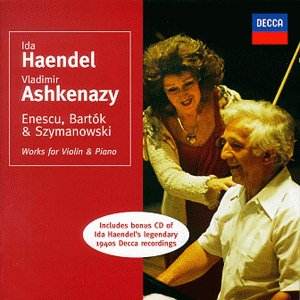BARTOK: First Rhapsody, Romanian Folkdances;
ENESCU: Violin Sonata No.3;
SZYMANOWSKI: Mythes,
Op.30
 Ida Haendel (violin) &
Vladimir Ashkenazy (piano)
Ida Haendel (violin) &
Vladimir Ashkenazy (piano)
 DECCA 455 488-2 [60'
55"] Plus bonus CD - "Ida Haendel: the Decca Years, 1940-47" [75'09"]
DECCA 455 488-2 [60'
55"] Plus bonus CD - "Ida Haendel: the Decca Years, 1940-47" [75'09"]

New recordings from Ida Haendel are rare enough for this one to have leapt
from the release sheets. Expectations are exceeded. Recorded in 1996 (a year
after the long-released Testament set of Bach's Sonatas and Partitas - SBT
2090) Haendel was obviously in a glorious vein of form during this period.
I'm not sure how many concerts this Polish-born virtuoso now gives (she was
born in 1923), but I think it's fair to say that she has somewhat faded from
contemporary view. Hopefully this issue will add new members to her many
existing admirers.
She brings Szymanowski's Mythes to life with a communicative intensity that
is intoxicating. Her vibrant tone, wide range of colours, variety of sound
and imaginative dynamic contrasts keep the listener enthralled. These are
renditions high on imagery. The Enescu (with whom she studied) is a wonderful
piece saturated in folkmusic - popular culture harnessed to sophisticated
structure and technique. Again Haendel has total identification with this
music, presenting it with devotion, personal reference and an innate ability
to phrase and colour this rich music.
In both these substantial pieces, Ashkenazy matches Haendel for commitment
but cannot always accomplish the biggest gestures without recourse to
over-strenuous execution, which sometimes causes clattering piano sound.
Whereas Haendel soars to emotional narration, Ashkenazy strives towards to
it. This may account for what I thought to be occasional imbalances in the
recording. It is, on reflection, that Haendel is able to paint this music
on a bigger canvas. Nevertheless, he too has the ability to bring this music
alive (particularly the Mythes) and it appears these artists have developed
a close rapport. If one can imagine Szymanowski's tripartite work sounding
even more impressionistic than here, and the Enescu being even more darkly
suggestive, this duo have achieved something wholly compelling. The big and
bold effects that violinist and pianist relish are complemented by subtle
and pictorial aspects. Both players certainly embrace these scores' inner-worlds
but Haendel, through knowing this music longer I imagine, has more fully
absorbed such interior expression. The Bartok Rhapsody (a pity No.2 isn't
included) is full of fire, the folk-tunes sounded with beguiling naturalness.
It's a shame that in both the Rhapsody and (particularly) the Romanian
Folkdances, Ashkenazy's playing veers towards a too accompanimental role
(although sympathetic as such) in response to Bartok's less demanding writing.
Ashkenazy is no weak link though, he contributes much to this animated
music-making which overflows with life and musicality.
Might there be more new material from Haendel? I hope so, I've always liked
her sincerity, command and vividness - and I'm very grateful for her recordings
of Britten's, Elgar's and Walton's Concertos. I believe Decca has a tape
of Vaughan Williams's The Lark Ascending (with Norrington). If Norrington's
VW cycle has indeed fallen victim to recording cutbacks, it would be marvellous
if Decca could find a way of letting us have Haendel's Lark, which I would
love to hear.
The bonus CD of Haendel's 1940s Decca recordings has 75 minutes of Beethoven,
Schubert, Kreisler, Sarasate, more Szymanowski and, for comparison, a 1947
recording of Bartok's Romanian Folkdances. This is no sampler CD but one
containing thirteen complete works, well transferred. 50 years on Haendel
remains a remarkably fine player and this generous release deserves every
success.
Reviewer
Colin Anderson

